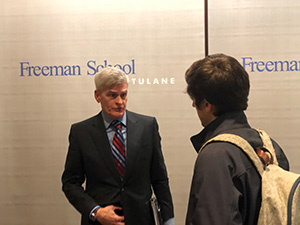On the day the U.S. House of Representatives passed the sweeping $1 trillion infrastructure bill he worked tirelessly to craft, Sen. Bill Cassidy, R-La., visited the Freeman School to talk to energy students in the undergraduate and Master of Management in Energy programs about what the historic bipartisan legislation means for the future of the industry.
With a three-pronged goal of lowering climate intensity, preserving energy security and helping Americans achieve prosperity, Cassidy said the legislation will help states like Louisiana adapt systems developed for fossil fuel to accommodate renewable energy sources. The bill includes, for example, $8 billion to develop regional clean hydrogen hubs that can generate environmentally friendly blue hydrogen from natural gas, $6 billion to help build pipelines to sequester the resulting carbon dioxide, and $17 billion for ports to help support the transition to hydrogen-based fuels.

Sen. Bill Cassidy, R-La., visited Freeman to speak to energy students about what the bipartisan infrastructure bill will mean for the energy industry.
“In all this, we can continue to use the core competency of what our state provides and at the same time go to a lower carbon future,” Cassidy said. “Simultaneously, not just preserving the job of the person who wants a better life for his daughter or her daughter, but actually enhancing it, because now the pipe fitter is making pipelines … to sequester this material.
“This is very intentional in the provisions that we have included,” Cassidy continued. “What permeates this entirely is finance. If any aspect of this doesn’t work, none of it works. That future I laid out — the family in the bayou does better, the company achieves net carbon neutrality, we remain energy secure — is all related to the bill that was put together. Never has there been a generation of folks of your age who are at the cross point of where we go, so I applaud you all for your interest. When one of you is giving this lecture when you’re my age to a group of folks who are your age, 40 years from now, they will ask you about this moment — ‘How did you do it?’”
Sen. Cassidy’s visit to Freeman was organized by Eric Smith, professor of practice and associate director of the Tulane Energy Institute.
“I met Sen. Cassidy at a lecture he delivered in Baton Rouge about what the infrastructure bill would mean for both classical infrastructure, like bridges, roads and ports, as well as for the transition to cleaner energy, spanning everything from hardening the grid to underwriting the reduction of CO2 emissions and enabling green and blue hydrogen supplies,” said Smith. “As future energy professionals, our graduate and undergraduate students will play a central role in ensuring that those infrastructure funds are spent wisely. That explains their interest in hearing from Sen. Cassidy about what the bill’s contents are and what they mean for the future of Louisiana’s most significant industry.”

